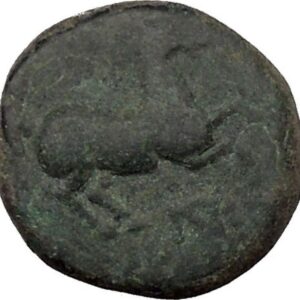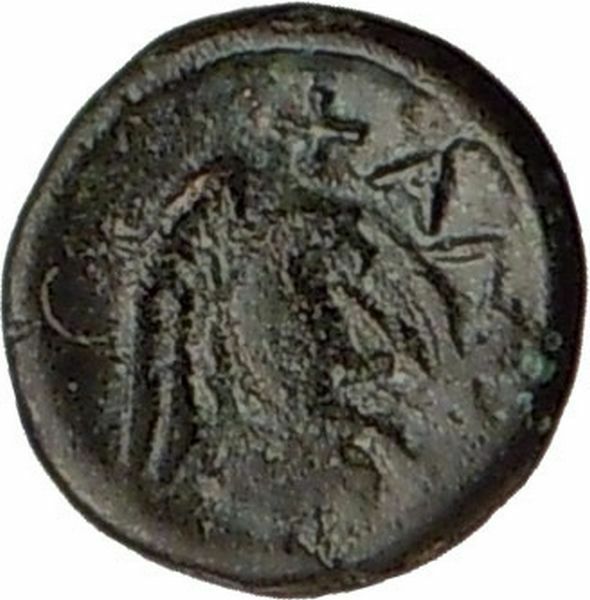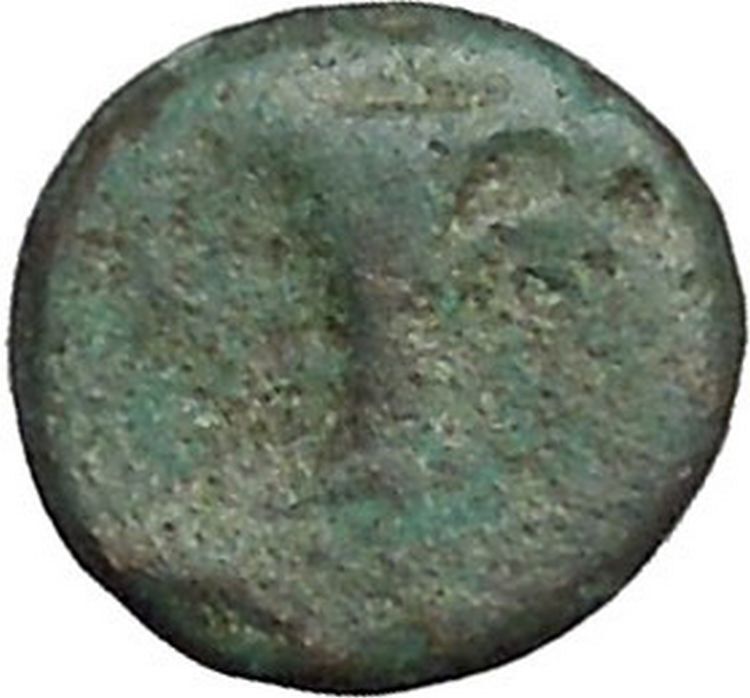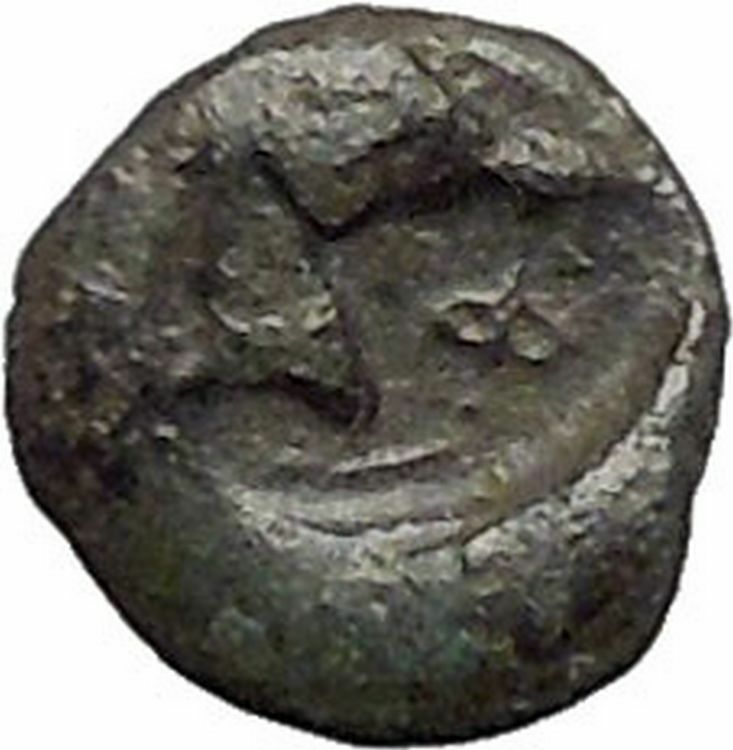|
Greek coin of Seleukid Kingdom
Tryphon – King 142-138 B.C.
Bronze 18mm (4.86 grams) Struck circa 142-138 B.C.
Reference: HGC 9, 1061; Sear 7089
Diademed head of Tryphon right.
ΒΑΣΙΛΕΩΣ ΤΡΥΦΩΝΟΣ / AYTOKPATOPOΣ, Spiked Macedonian helmet adorned with wild goat horns right; symbols or monogram to left.
Tryphon having disposed of the child Antiochos VI, Diodotos proclaimed himself king under the name of Tryphon and with remarkable title ‘Autokrator’. After a reign of four years he was overthrown by Antiochos VII, younger brother of Demetrios II.
You are bidding on the exact item pictured, provided with a Certificate of Authenticity and Lifetime Guarantee of Authenticity.
Diodotus Tryphon (Greek: Διόδοτος Τρύφων) was king of the Hellenistic Seleucid Empire. As a general of the army, he promoted the claims of Antiochus VI Dionysus, the infant son of Alexander Balas, in Antioch after Alexander’s death, but then in 142 deposed the child and himself seized power in Coele-Syria where Demetrius II Nicator was unpopular for his oppressive treatment of the Jews.
The internal situation in the Seleucid domains was so convoluted, and Diodotus was so eager to gain allies, that in 143 BC Hasmonean rule was reinstated in Judea in exchange for aid. True to their word, several Jewish armies marched against Diodotus’ rival Demetrius and opposing cities. However, the Jewish forces under the High Priest Jonathan behaved too boldly, leading to his capture and murder by ruse when Diodotus marched into Judea. Despite his preparations and intentions to cow the Jews, Diodotus was entirely unsuccessful, and left the region under the rule of Jonathan’s brother Simon, with little gain beyond a minor tribute of 100 talents. Finally, in 138 Diodotus was attacked and defeated in Antioch by Antiochus VII of Side. Diodotus committed suicide after his defeat.
In 138 BC, Diodotus claimed that his charge, the young Antiochus VI, had contracted an illness and required surgery, during which he died – presumably disguising his murder at his supposed benefactor’s bequest.
 The Seleucid Empire was a Hellenistic state ruled by the Seleucid dynasty founded by Seleucus I Nicator following the division of the empire created by Alexander the Great. Seleucus received Babylonia and, from there, expanded his dominions to include much of Alexander’s near eastern territories. At the height of its power, it included central Anatolia, the Levant, Mesopotamia, Kuwait, Persia, Afghanistan, Turkmenistan, and northwest parts of India. The Seleucid Empire was a Hellenistic state ruled by the Seleucid dynasty founded by Seleucus I Nicator following the division of the empire created by Alexander the Great. Seleucus received Babylonia and, from there, expanded his dominions to include much of Alexander’s near eastern territories. At the height of its power, it included central Anatolia, the Levant, Mesopotamia, Kuwait, Persia, Afghanistan, Turkmenistan, and northwest parts of India.
The Seleucid Empire was a major center of Hellenistic culture that maintained the preeminence of Greek customs where a Greek-Macedonian political elite dominated, mostly in the urban areas. The Greek population of the cities who formed the dominant elite were reinforced by emigration from Greece. Seleucid expansion into Anatolia and Greece was abruptly halted after decisive defeats at the hands of the Roman army. Their attempts to defeat their old enemy Ptolemaic Egypt were frustrated by Roman demands. Much of the eastern part of the empire was conquered by the Parthians under Mithridates I of Parthia in the mid-2nd century BC, yet the Seleucid kings continued to rule a rump state from the Seleukid Kingdom until the invasion by Armenian king Tigranes the Great and their ultimate overthrow by the Roman general Pompey.
|





 The Seleucid Empire was a Hellenistic state ruled by the Seleucid dynasty founded by Seleucus I Nicator following the division of the empire created by Alexander the Great. Seleucus received Babylonia and, from there, expanded his dominions to include much of Alexander’s near eastern territories. At the height of its power, it included central Anatolia, the Levant, Mesopotamia, Kuwait, Persia, Afghanistan, Turkmenistan, and northwest parts of India.
The Seleucid Empire was a Hellenistic state ruled by the Seleucid dynasty founded by Seleucus I Nicator following the division of the empire created by Alexander the Great. Seleucus received Babylonia and, from there, expanded his dominions to include much of Alexander’s near eastern territories. At the height of its power, it included central Anatolia, the Levant, Mesopotamia, Kuwait, Persia, Afghanistan, Turkmenistan, and northwest parts of India.




